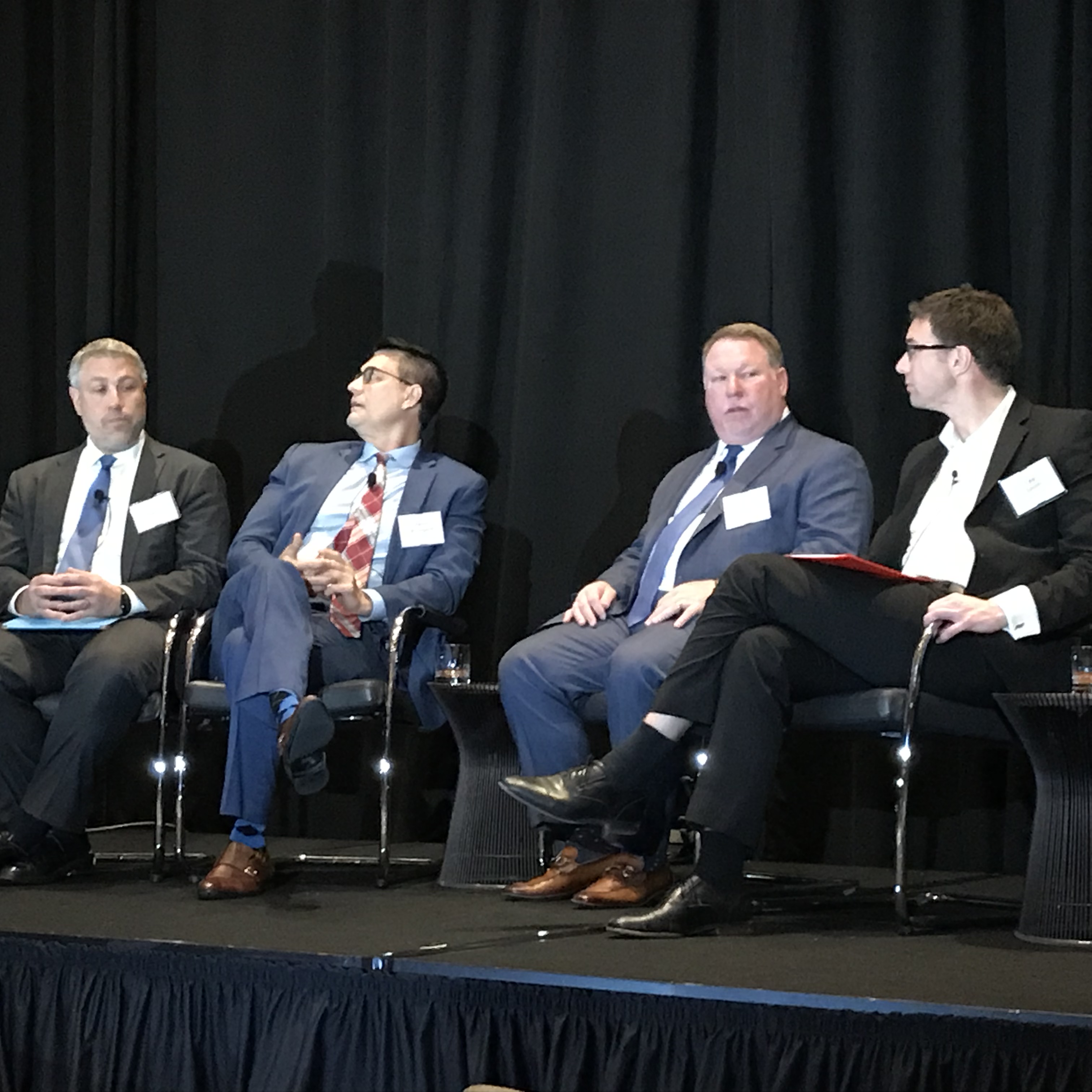TRENDING WHITEPAPERS,VIDEOS & MORE

tim
Executives Discuss the Outlook for Liquidity and M&A
- Sunday, 21 April 2019

At the IMN Residential Mortgage Servicing Rights Forum last week the issues of liquidity and the outlook for mergers and acquistions (M&A) came up.
Liquidity is something that many of the CEO’s are focused on. Aaron Samples, CEO of First Guarantee commented “ Where the last cycle was credit driven more than anything else, for this cycle it’s going to be liquidity that shapes the market”.
Right now the bigger players access to liquidity seems pretty easy to get. For the small players things can be a bit more difficult. Wherehouse lenders, debt deals and equity sales have all proven to be ways to access capital. According to Kevin Brungardt, CEO of Roundpoint Mortgage Servicing Corp “Liquidity isn’t an issue from the debt side. A few years ago we did an MSR advance facility. We could only get conventional products at 6.5% LIBOR. It was standard leverage. We refinance last summer. We put in conventional and Ginnie Mae, primarily at the same advance rates, and doubled the size. We were nearly three times subscribed. But be careful with the leverage. When rates die 50 basis points, as an independent you have to make sure you have the liquidity to cover those margin calls as soon as you get them. And I think people fall in love with that leverage. The equity side is a bit more difficult. We did a preferred offering last year for about a 21% interest in the organization. We were able to place that as well, but it proved a little more expensive that the previous leverage on the MSR rights.”
[caption id="attachment_11840" align="alignleft" width="300"] Chris Mayer, CEO, Longbridge Financial; Kevin Brungardt, CEO Roundpoint Mortgage Servicing Corp, Aaron Samples, CEO First Guaranty Mortgage Corp; Lee Smith, EVP/COO Flagstar Bank.[/caption]
Chris Mayer, CEO, Longbridge Financial; Kevin Brungardt, CEO Roundpoint Mortgage Servicing Corp, Aaron Samples, CEO First Guaranty Mortgage Corp; Lee Smith, EVP/COO Flagstar Bank.[/caption]
As for the M&A opportunity on the originators side, the feeling is that a good amount of M&A is going on, even though the pricing isn’t quite where some would want it to be to get a deal done. There are companies that are looking to do some opportunistic buying and looking at how best to structure a deal. How to structure isn’t always what drives the deal though. According to Lee Smith, EVP/COO of Flagstar Bank “I’m a big believer that the deals that get done are about the people involved. If there is a desire on the part of the people involved to get a deal done, and the deal works for both parties, the deal will get done.
Excess capacity might drive M&A on the servicing side. “It’s always a difficult balance between does the platform make sense, does the asset make sense, is it strategic and are there synergies to be had. I think your going to see big deals coming to market” said Mr Brungardt. “ I think people continue to need scale to make sense, to get the return out of the business that they need. There have been tailwinds with interest rates in the last quarter and that gives people hope, but hope is not a great strategy. I think we have had more productivity in this space that we ever had in the past and with that productivity comes overcapacity. So I think it’s important to understand that we are using AI, we are using robotics, we’re using offshore labor and we are using more technology. This all creates more capacity. So I think there is overcapacity and there needs to be more M&A, especially on the servicing side.”
The reverse mortgage market has seen significant declines in FHA and Ginnie lending due to regulatory changes. This has lead to overcapacity in this sector as well. Chris Mayer, CEO of Longbridge Financial commented “ I think the sector would find a bit of consolidation would be valuable on the servicing/capital markets side. For originations there really is no big scale economies in the business. The folks with the originating capacity are trying to reduce it. So it’s not going to be consolidation as much as closing down some of the capacity. I think it would be helpful to see some M&A on the back side of the business.”
Read more...
U.S. Economy Still on Track to Slow in 2019
- Thursday, 18 April 2019

Housing Market Supported by Lower Rates, Improved Wage Growth
In the just released Fannie Mae Economic and Strategic Research (ESR) Group’s April outlook, economic growth for 2019 continues to be forecast at 2.2 percent, down from 3.0 percent in 2018. The report goes on to say "The fading impact of last year’s fiscal stimulus as well as slowing business investment and consumer spending were again identified as the primary drivers behind the expected sluggishness in GDP growth, but residential fixed investment is projected to rebound. The second half of the year is expected to feature stronger economic growth as the real effects from the partial government shutdown and the fourth quarter stock market volatility wane amid dovish Federal Reserve policy. The ESR Group maintained its prediction for one interest rate hike in 2019 but pushed back its expected timing to December due to the Fed’s plans to stop trimming its balance sheet by September.
The ESR Group continues to project home sales in 2019 to hold steady at 2018 levels, supported by improved wage growth, slowing home price appreciation, and lower mortgage rates. Purchase mortgage origination volume is projected to rise moderately amid flat home sales and slower home price appreciation. Given the recent decline in interest rates, refinance mortgage origination volume is now expected to come in higher than previously forecast, though still down modestly year over year".
“Incoming data continue to support our call for slower economic growth in 2019,” said Fannie Mae Chief Economist Doug Duncan. “Domestic demand growth has slowed as businesses and consumers exert greater caution amid trade uncertainty and capital markets volatility. The predominant downside risks – the US-China trade dispute and slowing global growth – are expected to ease later this year, which should help bolster growth in the second half. Despite its self-described ‘patience,’ we still expect the Fed to raise its key policy rate at the end of the year due to stronger second-half growth.”
“On housing, the recent dip in mortgage rates to their lowest level in over a year – combined with wage gains and home price deceleration – supports our contention that home sales will stabilize in 2019,” Duncan continued. “The greatest impediment to both sales and affordability continues to be on the supply side, as new inventory, particularly among existing homes, is being met quickly by strong demand – as evidenced by the already thin months’ supply hitting a new one-year low.”
Visit the Economic & Strategic Research site at www.fanniemae.com to read the full April 2019 Economic Outlook, including the Economic Developments Commentary, Economic Forecast, Housing Forecast, and Multifamily Market Commentary. To receive e-mail updates with other housing market research from Fannie Mae’s Economic & Strategic Research Group, please click here.
Read more...
Clear Capital Unveils Data-Driven Appraisal Option
- Thursday, 18 April 2019

Clear Capital today unveiled its Modern Appraisal Program, giving lenders turnkey access to the industry's emerging bifurcation initiatives for originating loans. The program is live nationwide and already being used to complete several thousand transactions per month on origination loans, with further aggressive expansion planned throughout 2019 and beyond.
"The ongoing technology, data, and process investments we make to support lenders, investors, and their customers made it possible to adapt our lean valuation manufacturing processes for appraisal modernization," said Clear Capital President Kevin Marshall. "In fact, we've been performing pilots and refining tools and methods for more than two years on thousands of loans. With the entire lending industry moving toward the full digital mortgage, now is the time for thoughtful evolution in the appraisal space."
Clear Capital's Modern Appraisal Program uses ClearInspect™ — Clear Capital's new, intuitive mobile app — to guide appraisers, agents, brokers, and other data collectors step-by-step through a property data collection process to ensure quality and efficiency. The results can easily be delivered to customers, government sponsored enterprises (GSEs), and appraisers who may perform a desktop valuation based upon the collected property data.
Complementing the ClearInspect mobile app is a nationally-scaled, field-tested Data Collection Certification Program. The program has already successfully certified nearly 400 new data collectors in the art and science of property measurement, sketching, data capture, and more, with more certifications on the way.
Clear Capital strongly believes appraisers are critical to the valuation process and is a licensed appraisal management company (AMC) with nationwide coverage. Clear Capital also operates a separate, staff appraisal firm that supports large lender customers nationwide. The company's Modern Appraisal Program supports the use of appraisers and non-appraisers alike in the property data collection process.
"Our Modern Appraisal Program is the result of years of building strong partnerships with lenders and the GSEs, countless hours of research and tech development, and a dedication to pioneering the future of real estate valuation," said Jeff Allen, executive vice president of valuation strategy at Clear Capital. "The combination of our rigorous certification program, easy-to-use mobile app, team of highly-trained data collectors, and meticulous quality control makes Clear Capital's Modern Appraisal Program stand out from the rest."
Read more...




